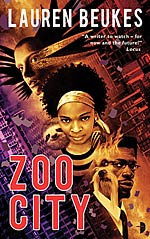
![]() Emil
Emil
4/11/2011
![]()
Zoo City completely earned the label "urban fantasy," where the city is not just the backdrop for the story, but gives it its form and flavour. It's the gritty, urban environment of a futuristic Johannesburg with haunting characters and an extremely well-crafted protagonist, Zinzi December. As a whole it owes a modest debt to noir fiction, with the story writhering back and forth, even if slightly predictable. However, Zinzi's character, fraught with moral indignation and wrong choices, the fabulous wordplay and colorful images in the narritive, filled with unknowable magic, imaginative settings and its dark and cynical heart all makes up for the (inconsequential) predictability.
Beukes does an excellent job in building a strange, dark and mythical world. Between chapters, documentaries, magazine articles, interviews, academic references, and so on give us glimpses of the world outside of South Africa and tell us a little more about the "animalled" phenomenon, and the ominous Undertow - a more than subtle nod to Philip Pullman's His Dark Materials series. However, unlike Pullman's daemons, the animals in Zoo City reflect less inherent personality characteristics - they are companions, but come to represent much as an elaborated theme on social markers. Call it stigmatizing, hence the derogatory reference to "zoos" from those outside Zoo City. The ambiguity lies in the reality that these social markers can provide comfort, and yet, also come to represent both peril and power - it is an obligatory attachment to the animal, hightened (and hardened) by the stark phenomenon that should the animal perish, the human companion will follow, claimed by the Undertow.
Despite Johannesburg of Zoo City being an urban ghetto, set in the mythical future against the background of African supernatural harangue, Beukes succeeds magnificently in creating the believe that she's in actual fact telling a story about our now, with its still eveident, malignant social prejudices, avaricious music moguls, 419 scams and the ghostly presence of a demented serial killer as graffiti on the murky city walls. This is skillful art. The best science fiction writers are those who can make you part of an extended universe of ever-evolving but divergent books, without the awfulness of the padded series, extending for volumes and volumes, seemingly unending and aimlessly trudging along. But Beukes can tell a story, and then finish it, even if that same story does leave so much more that can still be told. Much like real life, after all, with it's own delicate breed of unfinished business for which there is rarely the escape of a sequel. Zoo City can be read as allegory or prophecy, as magical realism or sleazy satire. Your pick. Beukes never tells you what.
A truly remarkable book, worthy of all the accolades and rave reviews. Different and original! Beukes has proved to be a creative force of nature!